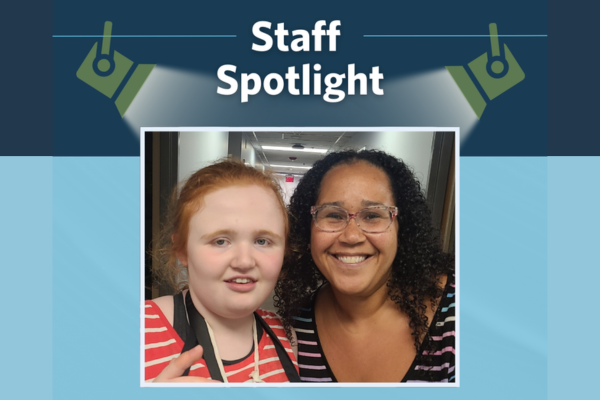Sheila Pickett, MS, BCBA, LABA, a vocational specialist in The New England Center for Children’s (NECC) Vocational Department, started at NECC as a level 2 teacher 11 years ago. She was nominated for Staff Spotlight because she is “passionate about vocational services and setting students up for success, both now and in adulthood. Sheila is a team player, willing to stop what she is doing to lend a hand to others. Sheila makes genuine connections with her students, and they love to see her. She also has great rapport with her colleagues and knows how to make work a little more fun.”
How long have you worked for NECC?
I have worked at NECC for 11 years. I started as a level 2 teacher on Francine Road (when it was a girls’ team) and worked as a residential coordinator on Oak Street for two years. I was interested in working with older students and learning about vocational work, so I moved to the IIP. While on IIP, I was a case manager and job coach. I helped several students with their graduation transition. Due to that, I became more interested in vocational work and helping our students become their most independent before they transition into adulthood and adult services.
What is your favorite part of your job?
Working with students at their vocational jobs is my favorite part of my job. When I was working as a job coach, I enjoyed seeing the skills we trained at the school become a part of the students’ repertoire at their community volunteer and paid job sites. Being a job coach really got me interested in joining the Vocational Services Department so I could continue to support students in gaining vocational skills and employment.
Why are vocational opportunities important for NECC students?
After having the opportunity to see some adult service programs while helping students with their transition into these programs, I saw firsthand how important it is for students to work on independence. For example, there were large parts of the day where clients were expected to engage in independent activities and help around the classroom. The more independent our students become, the more engaged they are throughout their day. Looking towards their futures, this becomes even more important during their adult lives. Vocational opportunities are important because they help teach our students meaningful skills and allow them to become active members of their communities, classrooms, or households. We meet them where they are. Some may volunteer or work paid jobs, while others will learn vocational skills that allow them to help with their daily activities around their homes and classrooms.
Why did you choose a career in helping children with autism? Why NECC?
I have always been drawn to jobs where I am working with people in some way. One of my first jobs when I was 17 was working as a camp counselor for a traveling teen camp. We would take tons of cool day and overnight trips, and I learned to perfect my headcount before I even knew what a headcount was! After college, I worked at a psychiatric hospital on a unit for teenagers. I learned a lot about mental health and how to handle tough situations. I became interested in working at NECC because I had a friend who was working here at the time and recommended it. I came in for a tour and an interview, and the rest is history!
Have you taken advantage of any of the grad programs or teacher training at NECC? If so, how has it affected your teaching style?
Yes, I earned my master’s degree through the Western New England University program. I did not know much about applied behavior analysis (ABA) before working at NECC, so going through the WNEU program had a huge effect in molding my teaching style. I have also had the opportunity to work with and be taught by some wonderful people who’ve also helped shape my teaching style.
What is something about you that your colleagues might be surprised to learn?
I am from the Bronx (New York) and Cardi B went to my high school!
What is your life philosophy or motto you like to live by?
My motto used to be, “Treat people how you want to be treated.” That was until someone told me to “treat people how THEY want to be treated.” We all have different preferences, wants, and needs. To me, this means respecting people’s boundaries, considering our differences, and respecting different perspectives.

